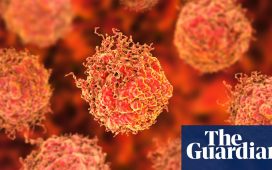Mayo Clinic experts say puberty blockers can lead to withering testicles, fertility problems and even cancer among the trans kids who take them, in the latest study to raise alarm about transgender medicine.
The findings cast doubt on the ‘reversibility’ of puberty blockers — a key claim of the trans activists who promote the drugs, saying they only ‘pause’ puberty and buy time for trans kids to make decisions about their gender.
Instead, researchers say puberty blockers hurt the development of testicles and sperm production in ways that are not fully reversible and could affect users’ ability to have children when they grow up.
‘At the tissue level, we report mild-to-severe sex gland atrophy in puberty blocker-treated children,’ the geneticist Nagarajan Kannan and others wrote in the 33-page study.

The Mayo Clinic’s 33-page study revealed puberty blocker damage at the cellular level

Trans activists say puberty blockers and other gender-affirming care is life-saving among a suicide-prone group
‘We provide unprecedented histological evidence revealing detrimental pediatric testicular sex gland responses’ to the drugs.
The study has not yet been peer-reviewed, but has been endorsed by Genspect, a global advocacy group against medical transitions, ‘Harry Potter‘ author J K Rowling, Benjamin Ryan, a prominent science writer, and others.
It takes aim at one of the most controversial issues of our time — whether to provide drugs and surgery to kids who experience gender confusion or ‘dysphoria’ and ask their parents or doctors for help.
Puberty blockers were originally developed to suppress the hormones of minors who started puberty too early.
They are nowadays prescribed off-label to a fast-growing number of trans children.
Advocates of gender-affirming care, as it is known, say it’s life-saving for a suicide-prone group, and that puberty blockers help pre-teens ‘pause’ their puberty and buy time to weigh life-altering decisions.
Critics warn of surging numbers of young people who identify as trans, and say puberty blockers, cross-sex hormones and surgeries are often unnecessary and likely dangerous when counselling gets better results.

Puberty blocker prescriptions are continuing to rise in the United States

Most children who get treated with puberty blockers go on to cross-sex hormones, like this patient at Blue Mountain Clinic in Montana
Republican lawmakers have outlawed puberty blockers and other types of trans care for minors in nearly two dozen states.
Norway, Finland, Sweden, Holland, and the UK are among a growing list of European countries to have restricted or wholesale stopped trans interventions on children.
‘Whistleblowers have been saying this for ages: puberty blockers are not a pause button!’ Genspect posted about the research.
The study ‘reveals potential irreversible harm to the fertility of patients on these drugs,’ added the group.
For their study, Mayo researchers looked at one of the largest collections of testicular samples for patients aged 0-17 years, including those with gender dysphoria who both did and did not take puberty blockers.
They focussed on 87 children, including 16 boys aged 10-16 who identified as girls.
Nine of them were already taking puberty blockers — one for just three months, another for more than four years.
Among the nine who were taking blockers, two had abnormal features on their testicles that could be spotted from a physical examination.
Researchers highlighted the case of a 12-year-old boy who had taken puberty blockers for 14 months.

Puberty blockers are prescribed off-label to a fast-growing number of trans children

Chloe Cole, 19, who transitioned to male at 13 before later regretting her decision at 16, is among a growing number of young people who come to regret their trans treatments and seek to reverse them. She says she regrets taking puberty blockers at the age of 13 years

Elon Musk famously tweeted about the Britain’s decision to stop puberty blockers for kids
Nearly 60 percent of his sex glands had ‘fully atrophied,’ they said.
There was also an ‘appearance of microlithiasis,’ or small clusters of calcium that are linked to testicular cancer.
In a 14-year-old patient who had been on puberty blockers for four years, they found his sperm production cells were stunted.
Scientists at the world-famous clinic said the results were worrying, but that more research was needed.
The evidence of sex ‘gland atrophy and abnormalities from the histology data raise a potential concern regarding the complete ‘reversibility’ and reproductive fitness’ of sperm cells in boys who take puberty blockers, it said.
The study was first reported on by Christina Buttons, an independent journalist.
It comes on the heels of the so-called ‘WPATH files’ — leaked messages from the world’s top body for gender-affirming care, which showed clinicians behaving more like activists keeping quiet about the massive downsides of trans medicine.










